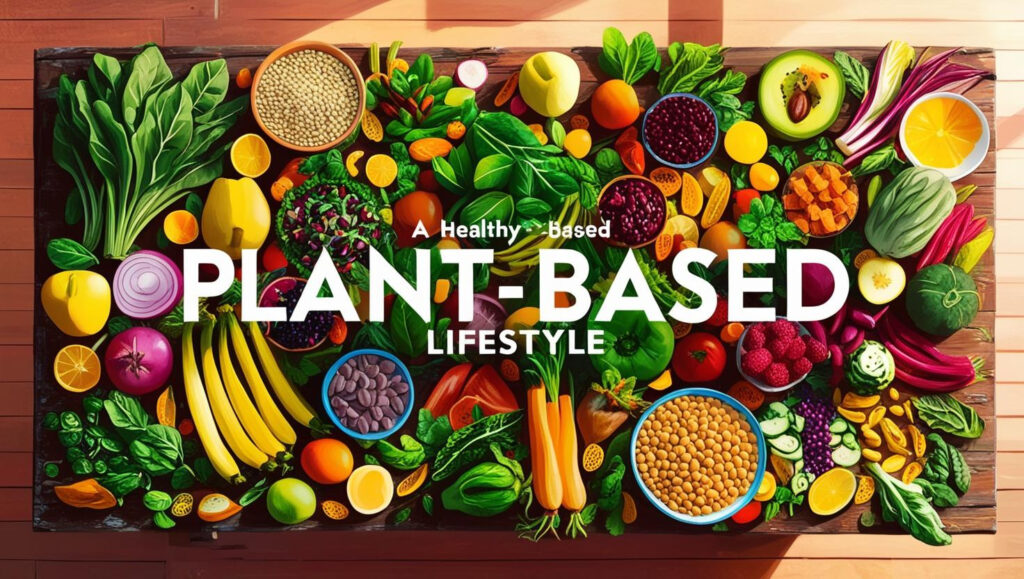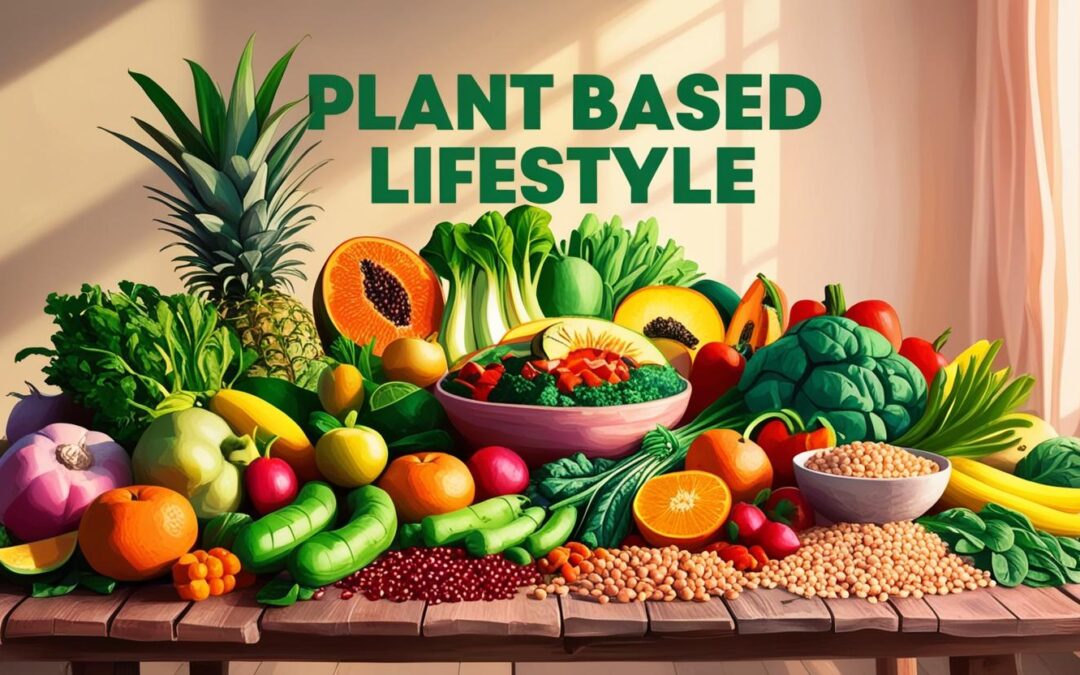Get ready to embark on an enlightening journey of understanding how the plant-based lifestyle is revolutionizing our planet! 🌎 Yes, you heard it right: choosing veggies over meats is a simple dietary switch and a powerful movement with substantial impacts on our world. This lifestyle advocates not only for our personal fitness goals but also for a sustainable and healthy earth. So, let’s take a refreshing route away from traditional eating habits and dive into this optimistic outlook on how going plant-based can make a world of difference. Be prepared, as the exploration might convince you that those leafy greens hold more power than you ever imagined! 🌿
Environmental Impact of a Plant-Based Lifestyle
Living a plant-based lifestyle doesn’t just mean receiving a robust nutritional diet; it also impacts the environment in significant ways. This article will focus on the environmental impact of a plant-based lifestyle, showcasing the positive changes that this lifestyle brings about in our world.
Reduction in Greenhouse Gas Emissions
One of the most substantial benefits of a plant-based lifestyle is its ability to reduce greenhouse gas emissions.
Impact on Agriculture
In terms of agriculture, the plant-based lifestyle significantly reduces the need for large-scale animal farming. These intensive farming methods often produce high methane and nitrogen dioxide gas emissions, contributing to the greenhouse effect. By shifting to plant-based agriculture, the emission of these harmful gases is reduced.
Comparative Analysis with Animal-Based Diets
The energy efficiency is striking when you compare a plant-based diet to an animal-based diet. Growing plants for food takes much less energy (and consequently, less greenhouse gas emissions) than raising, feeding, and processing animals for food.
Conservation of Water Resources
Aside from greenhouse gas emissions, water conservation is another integral factor that highlights the environmental benefits of a plant-based lifestyle.
Water Usage in Plant-Based vs. Meat Production
Water usage for plant-based food production is significantly less than for meat production. For example, a single pound of beef needs approximately 1,800 gallons of water whereas staples like wheat or potatoes require a fraction of this.
Impact on Global Water Shortages
Decreasing meat production in favor of more plant growing can also help alleviate global water shortages. This is because plants are generally more water-efficient and will relieve pressure on current water scarcity issues.
Biodiversity and Habitat Preservation
Besides reducing emissions and conserving water, a plant-based lifestyle aids biodiversity and habitat preservation.
Reduced Deforestation
Such a lifestyle aids in reduced deforestation as there is less need to create more farmlands for animal grazing or grow crops to feed animals. Resultantly, we can spare more land for natural habitats, forests, and biodiversity to thrive.
Impact on Wildlife
Adopting a plant-based lifestyle can reduce wildlife displacement triggered by agriculture expansion. More plants mean less habitat disruption, allowing wildlife populations to sustain or potentially increase.
To summarize, the environmental impact of a plant-based lifestyle is multi-faceted and quite profound. The wide-reaching benefits touch on aspects of greenhouse gas reduction, water conservation, and biodiversity preservation, all of which contribute to the health of our planet. 🌱

Health Benefits of a Plant-Based Diet
The promise of far-reaching health benefits spearheads a significant shift towards the plant-based lifestyle. A plant-based diet, commonly consisting of fruits, vegetables, grains, nuts, and seeds, has a multitude of nutritional advantages and is often linked with the prevention of chronic diseases.
Nutritional Advantages
Rich in Vitamins and Minerals
The plant-based diet is rich in vitamins and minerals, vital for our body’s overall well-being. Foods like fruits, vegetables, and whole grains are bountiful in vitamins A, C, E, and K and minerals such as potassium, magnesium, and calcium. Vitamin-rich foods boost immunity, support cell growth, and aid in critical bodily functions, while minerals play a key role in bone health, fluid balance, and several metabolic processes. People adhering to a plant-based eating regimen thus tend to meet their nutritional requirements more efficiently.
Lower in Saturated Fats
A striking feature of the plant-based diet is its inherently low in saturated fats, which are mainly found in meat and dairy products. High levels of saturated fats are associated with increased LDL (bad cholesterol) levels, leading to heart diseases. As a result, a plant-based diet can be strategic in maintaining healthy cholesterol levels owing to its reduced saturated fat content.
Prevention of Chronic Diseases
Impact on Heart Health
Plant-based diets have been identified as a proactive approach towards better heart health. They are low in components that harm the heart, such as saturated fats and cholesterol, while rich in fiber, phytochemicals, and antioxidants that protect the heart. Studies have shown that people following a predominantly plant-based diet have a lower risk of heart disease as compared to those who consume meat regularly.
Reduced Risk of Diabetes
Diabetes, a significant global health issue, has been found to have a reduced risk among those who follow a plant-based lifestyle. Plant-based diets improve insulin sensitivity, regulate blood sugar levels, and are effective in maintaining a healthy body weight, all of which aid in diabetes prevention. A multitude of research supports the effectiveness of such diets in diabetes management and risk reduction. Plant-based diets are an effective strategy to tackle the increasing prevalence of this chronic disease.
Besides being a sustainable choice, adopting a plant-based lifestyle is a powerful means to secure significant health benefits. Emphasizing plant foods presents evident nutritional advantages that contribute to preventing and managing chronic diseases – making it an essential part of maintaining a healthy lifestyle. 🌱
Economic Influence of Plant-Based Diets
The economic influence of plant-based diets is a multi-faceted trend that offers both growth and challenge opportunities in different markets and sectors. It has an impressive growth rate and a predicted transformative economic impact in the future.
Growth of Plant-Based Markets
One of the most significant economic impacts of the plant-based lifestyle is the robust growth of plant-based markets.
Rise in Plant-Based Food Products
Plant-based food products are quickly gaining popularity, a trend driven by increasing consumer awareness about environmental sustainability, health benefits, and ethical considerations; according to a report by Meticulous Research, the global plant-based food market is expected to reach $74.2 billion by 2027, growing at a CAGR of 11.9% during the forecast period to 2027.
From dairy-free alternatives such as nut milk and soy cheese to meat substitutes like seitan sausages and tempeh burgers, the variety and availability of plant-based food products have significantly expanded. The rising demand for these options is compelling more manufacturers and restaurants to invest in plant-based innovations.
Impact on Traditional Livestock Industries
The growth in plant-based diets has an undebatable effect on the traditional livestock industries. The rising demand for plant-based options is leading to a decrease in the consumption of conventional animal-based products in some regions.
It is posing a challenge for traditional livestock industries, which now need to adapt and innovate to stay competitive. Some livestock companies are indeed investing in the plant-based sector to diversify their offerings and align with evolving consumer preferences.
Job Creation and Economic Opportunities
In addition to shaping the future of food production, plant-based diets offer numerous economic opportunities.
Emerging Markets and Startups
Plant-based diets are creating new industries and giving rise to the proliferation of startups and small businesses centered around vegan and vegetarian food production.
These new markets and startups create jobs, contribute to the economy, and provide ample opportunities for investors looking for sustainable investment options. Plant-based diets create a new spectrum of professional opportunities, from soy farmers to vegan chefs.
Innovation in Food Technology
Perhaps one of the most ambitious fields that a plant-based lifestyle inspires is the innovation in food technology. Food tech companies are developing cutting-edge technologies to create plant-based meat and dairy alternatives that taste justlike the real thing.
Companies like Beyond Meat and Impossible Foods are revolutionizing the industry with their innovative plant-based products. Their success illustrates the vast potentials for economic growth and job creation in the sector, all driven by the adoption of plant-based lifestyles.
The economic influence of a plant-based lifestyle is reshaping industries, creating jobs, and paving the path for a sustainable and inclusive future. As more and more people continue to embrace this lifestyle, its economic impact will only further deepen, making it a vital part of our global economic landscape. 🌱

Cultural and Social Impacts of Adopting a Plant-Based Lifestyle
Changes in Dietary Habits
Adopting a plant-based lifestyle initiates significant changes in dietary habits, thus, playing a crucial role in reshaping societal norms and cultural practices.
Shift in Global Cuisine
A significant shift in global cuisine is one of the most notable changes brought about by the rise of plant-based eating. As more people adopt a vegan or vegetarian lifestyle, traditional dishes have been reimagined and reinvented. From fast food chains offering vegan burgers to Michelin-star restaurants incorporating plant-based menus, this shift highlights the growing cultural acceptability of a diet free from animal products. People across the globe experience new flavors and dishes, fostering a sense of unity and shared experience 🌱.
Influence on Food Traditions
It’s equally important to consider the influence of a plant-based lifestyle on food traditions. Changing dietary habits often means challenging long-standing traditions and norms. Holidays, festivals, and family reunions, commonly centered around meals, have always embraced certain types of animal-based foods as a tradition. As individuals choose plant-based alternatives, these traditions evolve and take place in a manner that respects cultural significance and animal life.
Social Movements and Advocacy
Switching to plant-based diets is not merely about altering food preferences. It’s a part of broader social movements and advocacy efforts aimed at promoting a sustainable, ethical, and health-conscious lifestyle.
Role of Advocacy Groups
Advocacy groups play an essential role in driving the push towards plant-based living. These groups, often powered by both passionate individuals and evidence-based science, foster greater awareness about the health, environmental, and ethical implications of our food choices. They facilitate education, outreach, policy lobbying, and support those interested in embracing this lifestyle shift.
Impact on Policy and Regulation
Lastly, the plant-based movement significantly impacts policy and regulation. Increasing awareness of the positive effects of a plant-based lifestyle on climate change, animal welfare, and public health has prompted authorities to re-evaluate existing food policies. Moreover, many countries are promoting plant-based diets as a strategic decision to achieve sustainability goals.
Embracing the plant-based lifestyle hence, not only changes the way we feed ourselves but also influences the world we live in, impacting our cultural norms, social movements, and political agendas.






Let’s make a dramatic difference in the world with our food choices! Transitioning to a plant-based lifestyle isn’t merely a personal dietary choice; it’s a powerful act of stewardship for our planet. By embracing this way of living, individuals contribute to the reduction of greenhouse gas emissions, which are significantly higher in animal agriculture compared to plant farming. Imagine the ripple effect of each meal—choosing a vibrant plate of vegetables, grains, and legumes not only nourishes your body but also lessens the strain on our Earth’s resources. This shift fosters a profound connection between our choices and their environmental impact, creating a more sustainable future for generations to come!
If more people would eat more plants we would be healthier and the planet would be a much happier place. Why? because by eating more plants, more fruits, more veggies, we would also eat less meat. This would reduce the need to raise so many animals which would lead to a cleaner planet, people living longer and with less diseases and so on. The benefits and staggering if you start to think about it.